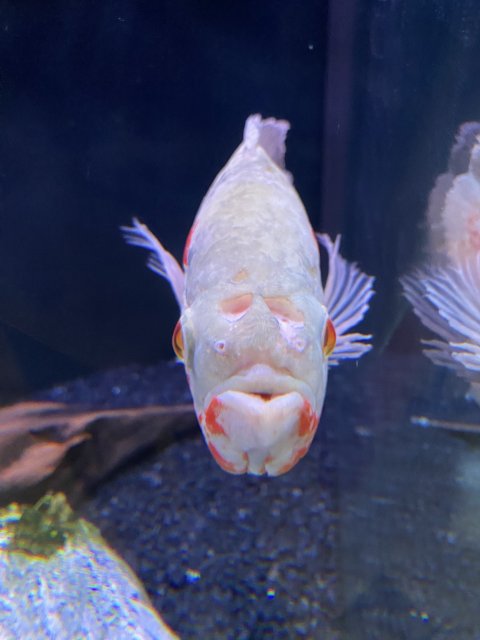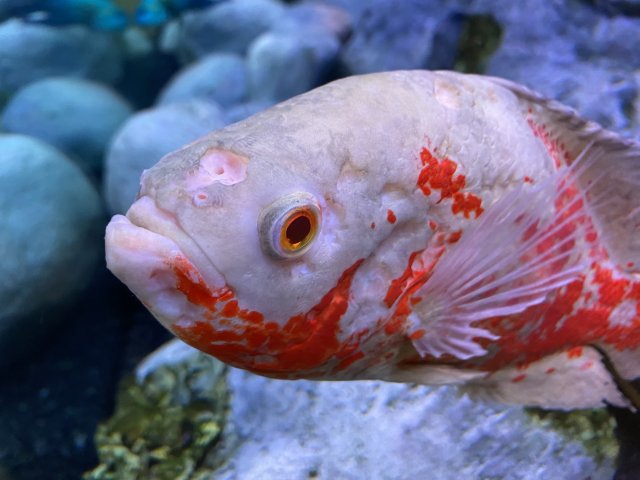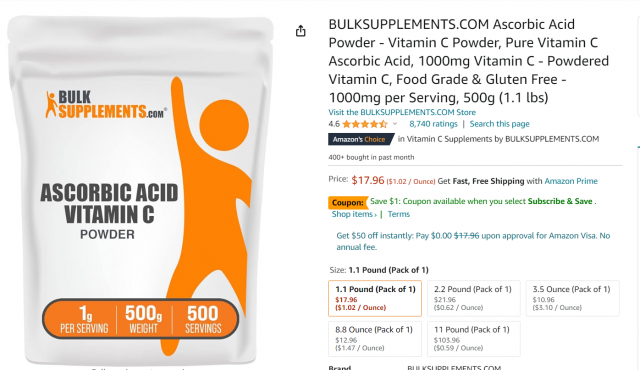- Have you tested your water?
- Yes
- If yes, what is your ammonia?
- 0
- If yes, what is your nitrite?
- 0
- If yes, what is your nitrate?
- 3-7ppm
- If I did not test my water...
- ...I recognize that I will likely be asked to do a test, and that water tests are critical for solving freshwater health problems.
- Do you do water changes?
- Yes
- What percentage of water do you change?
- 41-50%
- How frequently do you change your water?
- Every week
- If I do not change my water...
- ...I recognize that I will likely be recommended to do a water change, and water changes are critical for preventing future freshwater health problems.
This albino Oscar, Tina (we think its a she), has had a pretty bad bout with HITH. She's been treated with Metroplex laced food, API general cure in the water, and 3% epsom salt laden food. She also seems to have some fin rot going on as a secondary infection so the final treatment in the tank was Polyguard for any external stuff. All meds are now out of the tank through water changes.


The HITH progressed very quickly, even during treatment, but seems to have stopped getting any worse for the past 2-3 weeks or so. She is eating as aggressively as she always has, but seems to be healing very slowly.
She's in a 210 gallon tank with 2 FX-6 filters (no carbon has ever been used in these filters or the tank), a 57 watt UV sterilizer with a new lamp (UV was off as needed during treatments), a small Eheim surface skimmer to keep water surface clean, and an air stone for agitation. I keep water temp at 80F. This tank also houses an EBJD, a Venezuelan pike, a Red Tailed shark, a BN pleco and 5 red hook silver dollar. All fish are at least 2 or more years old except for Tina. I think she's maybe a year now. I don't see any aggression in the tank. She, the pike, and the EBJD all seem to have areas they call their own. No other fish has shown any signs of illness.
This tank's water used to be dGH 9-10, dKH 3-4, pH about 7.4. After learning here that Oscars tend to get HITH in water over 5 dGH hardness if nitrates are above 5, I've slowly over the course of a month or so, lowered the tank parameters to 5dGH, 1.5-2 dKH, pH set to 7 with a phosphate buffer. Tank has 32 stalks of lucky bamboo suspended with their roots in the water to uptake nitrate. There is zero ammonia and zero nitrite. The tank has been in operation for almost 2 years with the second FX-6 added about 6 months ago..
I live in AZ and the water here is pretty much the exact opposite of what you'd want in a Oscar tank, so I make RO/DI and re-mineralize. I routinely verify the RO/DI is doing its job. I do about a 50 gallon change once or twice a week, to keep nitrates below 5 as much as possible. I will admit that 6 months ago before the plants, nitrates used to get as high as 20-30ppm even doing water changes every other day. The plants really help keep the nitrates down. To the 50 gallon make up water, I add cichlid trace, equilibrium for 5 gH, and neutral regulator for ph 7. I used to use carbonate based buffers but trying to get a stable lower pH was very difficult. pH always tended rise back up to 7.4 or so. Once a week I add 8 grams of l-ascorbic acid to the tank (vitamin C). Also weekly, but not on the same day as the Vitamin C, I add Vitachem to the tank water.
They get fed a mixture of 4-5 different kinds of Hikari and Northfin pellets and sticks (some floating, some sinking) once a day, about 2.2grams of food for the whole tank, laced with Vitachem. They all eat pretty voraciously with the food gone in about 30sec - 1min.
We bought Tina from an LFS who said she was being bullied by two other paired-up Oscars, although she wasn't physically hurt at the time and she had no signs of HITH or other disease. Overall she has always seemed like a slow grower to me compared to the other Oscar I've had.
Questions: Is there anything else I should be doing to help Tina recover and be healthy? Am I feeding too little for right now while she heals? Any other advice on anything? How long should it normally take for these sores to heal?
I have learned a lot from MFK about how to take care of these fish but Oscars seem a challenge for me to keep healthy. Thanks for your time.


The HITH progressed very quickly, even during treatment, but seems to have stopped getting any worse for the past 2-3 weeks or so. She is eating as aggressively as she always has, but seems to be healing very slowly.
She's in a 210 gallon tank with 2 FX-6 filters (no carbon has ever been used in these filters or the tank), a 57 watt UV sterilizer with a new lamp (UV was off as needed during treatments), a small Eheim surface skimmer to keep water surface clean, and an air stone for agitation. I keep water temp at 80F. This tank also houses an EBJD, a Venezuelan pike, a Red Tailed shark, a BN pleco and 5 red hook silver dollar. All fish are at least 2 or more years old except for Tina. I think she's maybe a year now. I don't see any aggression in the tank. She, the pike, and the EBJD all seem to have areas they call their own. No other fish has shown any signs of illness.
This tank's water used to be dGH 9-10, dKH 3-4, pH about 7.4. After learning here that Oscars tend to get HITH in water over 5 dGH hardness if nitrates are above 5, I've slowly over the course of a month or so, lowered the tank parameters to 5dGH, 1.5-2 dKH, pH set to 7 with a phosphate buffer. Tank has 32 stalks of lucky bamboo suspended with their roots in the water to uptake nitrate. There is zero ammonia and zero nitrite. The tank has been in operation for almost 2 years with the second FX-6 added about 6 months ago..
I live in AZ and the water here is pretty much the exact opposite of what you'd want in a Oscar tank, so I make RO/DI and re-mineralize. I routinely verify the RO/DI is doing its job. I do about a 50 gallon change once or twice a week, to keep nitrates below 5 as much as possible. I will admit that 6 months ago before the plants, nitrates used to get as high as 20-30ppm even doing water changes every other day. The plants really help keep the nitrates down. To the 50 gallon make up water, I add cichlid trace, equilibrium for 5 gH, and neutral regulator for ph 7. I used to use carbonate based buffers but trying to get a stable lower pH was very difficult. pH always tended rise back up to 7.4 or so. Once a week I add 8 grams of l-ascorbic acid to the tank (vitamin C). Also weekly, but not on the same day as the Vitamin C, I add Vitachem to the tank water.
They get fed a mixture of 4-5 different kinds of Hikari and Northfin pellets and sticks (some floating, some sinking) once a day, about 2.2grams of food for the whole tank, laced with Vitachem. They all eat pretty voraciously with the food gone in about 30sec - 1min.
We bought Tina from an LFS who said she was being bullied by two other paired-up Oscars, although she wasn't physically hurt at the time and she had no signs of HITH or other disease. Overall she has always seemed like a slow grower to me compared to the other Oscar I've had.
Questions: Is there anything else I should be doing to help Tina recover and be healthy? Am I feeding too little for right now while she heals? Any other advice on anything? How long should it normally take for these sores to heal?
I have learned a lot from MFK about how to take care of these fish but Oscars seem a challenge for me to keep healthy. Thanks for your time.








